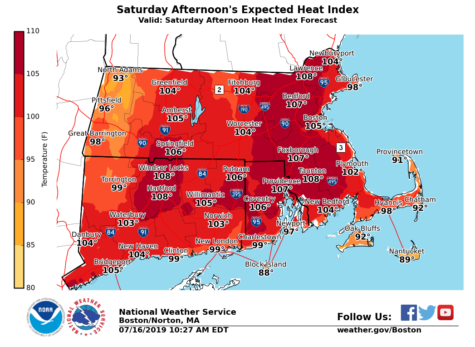URGENT – WEATHER MESSAGE
National Weather Service Boston/Norton MA
347 PM EDT Thu Jul 18 2019
…HEAT ADVISORY IN EFFECT FROM NOON FRIDAY TO 8 PM EDT SUNDAY…
The National Weather Service in Boston/Norton has issued a Heat Advisory, which is in effect from noon Friday to 8 PM EDT Sunday.
* HEAT INDEX VALUES…Will reach 96 to 102 degrees, especially Saturday and Sunday.
* TIMING…Noon Friday through Sunday evening, however the very worst of the heat will occur Saturday and Sunday.
* TEMPERATURE…Actual air temperatures will be in the upper 80s Friday, increasing to the 90 to 95 degree range both Saturday and Sunday. It will not cool off much overnight, with lows in most areas only dropping to the mid 70s.
* Impacts…The heat and humidity will cause heat stress during outdoor exertion or extended exposure.
* LOCATION… Cape Cod and Marthas Vineyard.
PRECAUTIONARY/PREPAREDNESS ACTIONS…
A Heat Advisory means that a period of hot temperatures is expected. The combination of hot temperatures and high humidity will combine to create a situation in which heat illnesses are possible. Drink plenty of fluids, stay in an air-conditioned room, stay out of the sunshine, and check up on relatives and neighbors.
Young children and pets should never be left unattended in vehicles under any circumstances. This is especially true during warm or hot weather when car interiors can reach lethal temperatures in a matter of minutes.
_____
MEMA encourages residents to stay safe during extreme heat
FRAMINGHAM, MA – Hot temperatures combined with high humidity levels are expected to create dangerous heat conditions, with the most oppressive conditions expected Saturday. High temperatures Friday-Sunday are forecast to be in the 90s to lower 100s, and dew points in the low to mid 70s. Heat index values are expected to reach the mid to upper 90s Friday, 100 to 110 Saturday, and 97 to 105 Sunday, with the highest values occurring on Saturday in eastern Massachusetts and parts of the Connecticut River valley. The hot temperatures and high heat indices can lead to serious heat related-illnesses.
“MEMA urges residents to take precautions during the upcoming extreme heat. Never leave children or pets alone in a closed vehicle, find an air-conditioned public space, cooling center, or other cool spot for relief, and watch for heat-related illnesses,” said Massachusetts Emergency Management Agency (MEMA) Director Samantha Phillips. “Please check on your family, friends, or neighbors to make sure they are safe during the extreme heat.”
Extreme Heat Safety Tips
- Never leave children or pets alone in a closed vehicle. Even with the windows cracked open, interior temperatures can rise almost 20°F within 10 minutes.
- Slow down and avoid strenuous activity.
- Drink plenty of fluids — even if you are not thirsty. Avoid alcoholic beverages and liquids high in sugar or caffeine. If your doctor generally limits the amount of fluid you drink, ask how much you should drink during hot weather.
- Wear lightweight, loose-fitting, light-colored clothing. Light colors reflect heat and sunlight, and help maintain normal body temperature.
- Stay indoors as much as possible and limit exposure to the sun. Do not leave pets outside for extended periods of time.
- If you must be outdoors, limit your outdoor activity to the morning and evening hours. Try to rest often in shady areas so your body temperature will have a chance to recover. Use sunscreen with a high SPF and wear a wide-brimmed hat.
- If you do not have air conditioning, stay on your lowest floor, out of the sun. Use fans to stay cool and avoid using your stove and oven. Consider spending time in air-conditioned public spaces, such as schools, libraries, theaters, and other community facilities.
- Check with your local authorities or Call 2-1-1 to find locations of cooling centers or shelters near you.
- On hot days, more people cool off around bodies of water. Playing in and around water can increase the risk of drowning. Learn how to keep yourself and your children safe in and around water with these Water Safety Tips.
- If there are power outages during warm weather, you may need to take additional precautions or go to a cooling center or emergency shelter to stay cool.
- Know the symptoms of and watch out for heat-related illnesses. Call 9-1-1 to report emergencies.
- Be a good neighbor. Check on family, friends, and neighbors, especially the elderly, those who live alone, those with medical conditions, those who may need additional assistance, and those who may not have air conditioning.
Types of Heat-related Illnesses
During extreme heat, people are susceptible to heat-related illnesses. Learn how to recognize and respond to them:
- Heat cramps are muscular pains and spasms caused by heavy sweating.
- Symptoms: Muscular pains and spasms that usually occur in the legs or abdomen
- Treatment: Get the person to rest in a comfortable position in a cooler place. Give the person water or fluids with electrolytes help them rehydrate.
- Heat exhaustion typically occurs when people overexert themselves in a warm, humid place, and often affects those doing strenuous work in hot weather. Body fluids are lost through heavy sweating and blood flow to the skin increases, causing blood flow to vital organs to decrease. This results in a form of mild shock.
- Symptoms: Cool, moist, pale or flushed skin, nausea, dizziness, headache, weakness, and/or exhaustion
- Treatment: Get the person to rest in a comfortable position in a cooler place. Remove or loosen tight clothing and apply cool, wet cloths, such as towels or sheets. If the person is conscious, give them half a glass of cool water or fluids with electrolytes every 15 minutes, making sure the person drinks slowly. Watch the person carefully for changes in his or her condition and call 9-1-1 if it doesn’t improve.
- Heat stroke is the most serious heat emergency and is life-threatening. Heat stroke develops when systems in the body begin to stop functioning due to extreme heat. Heat stroke may cause brain damage or death if the body is not cooled quickly.
- Symptoms: Extremely high body temperature, hot and red skin (dry or moist), loss of consciousness, changes in level of responsiveness rapid and weak pulse, rapid and shallow breathing, vomiting, confusion, and/or seizures
- Treatment: A person suffering from heat stroke needs immediate assistance. Call 9-1-1 and move the person to a cooler place. Immerse the individual in a cool bath, wrap in cold wet sheets, or cover the person in bags of ice.
For more information on heat-related illnesses and graphics, see https://www.cdc.gov/disasters/extremeheat/warning.html

























